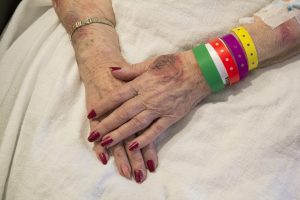
Although abusing an older person is something that would never cross most people’s minds, it’s a tragically prevalent circumstance in the United States. Elder abuse occurs in many forms, from emotional to physical, and it affects the most frail and vulnerable among us.
Considering that elder abuse is in many instances a voiceless problem, it’s extremely important for families and friends of older adults to be aware of the signs and symptoms of elder abuse so as to protect their older loved ones. Our home care professionals have pulled together a few of the warning signs that may indicate elder abuse.
Physical Abuse:
- Signs of injuries like bruises, scars, or welts, especially if they display symmetrically on both sides of the person’s body
- Sprains or broken bones
- Regularly missed medications or drug overdoses
- Broken eyeglasses
- Evidence of being restrained, like bruises or red marks on the wrists
- Caregivers who refuse to allow the senior to be seen alone
Emotional Abuse:
- Controlling tendencies from the caregiver, such as:
- Yelling at or making threats to the older adult
- Humiliating or ridiculing the senior
- Neglecting the older adult
- Isolating the senior from family and friends
- Behavior that resembles dementia, including rocking, sucking, or muttering to himself/herself
Neglect:
- Unhealthy weight loss or malnutrition
- Physical concerns, such as bed sores, that have not been taken care of
- Unsanitary living conditions
- Neglected personal cleanliness
- Inappropriate clothing or covering for the weather
- Dangerous living conditions (no running water or heat; faulty electrical wiring, other fire dangers)
- Abandonment of the older adult at a public place
The very early warning signs of elder abuse may be difficult to spot and may look to be signs or symptoms of Alzheimer’s or increased frailty. Alternatively, a caregiver who is abusing the older person may explain signs of abuse away. To help prevent abuse, be sure to visit and call senior loved ones often and be on the lookout for any changes in the older person’s personality or behavior. If any indicators of elder abuse are witnessed or suspected, they should be reported immediately.
Stowell Associates can help families keep loved ones safe, happy, and healthy. Our expert care managers help with in-home care services, including specialized dementia care in Waukesha and the surrounding areas, to ensure that seniors are safe and well cared for. Contact us in Milwaukee at 414.963.2600 and in Waukesha at 262.521.3016 for a professional in-home assessment to learn how we can help your loved one.









